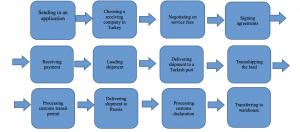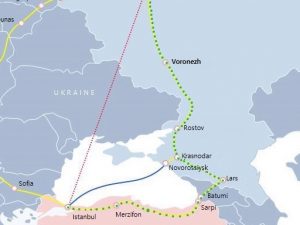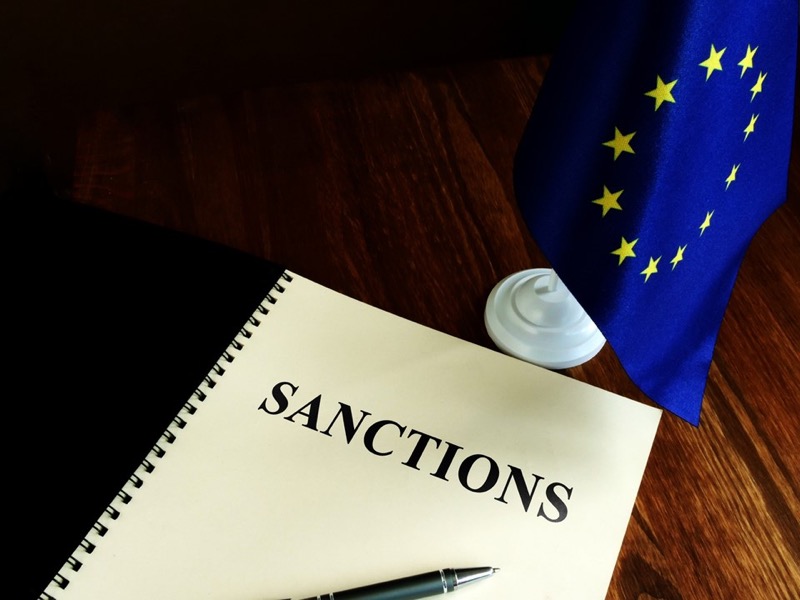While Russia is targeted by the economic sanctions, importers are actively seeking for the ways of evasion. The money transfer and logistics are among of those key issues to be solved. According to OSINT, the Kremlin opts for the following ways to avoid sanctions-derived restrictions.
- Running entities in third countries like Armenia, Georgia, Estonia, Iran, Kirgizstan, China, Turkey, and UAE. Concurrently, as per contracts, the official buyer is a designated entity located in the countries mentioned above. After the shipment has arrived, it is registered as transit and goes further to Russia.
A good instance of such a practice is what Russian—Turkish Business Council (RTBC, 109012, bldg.1, 6/1, Ilyinka str., Moscow Russia, www:rtbc.ru, e-mail: [email protected], [email protected], [email protected], tel:+84955029289, +84956200429) suggests:

Moreover, the following delivery routes could be used (Russian web resource):

Meanwhile, given that the EU has banned Russian and Belorussian logistics companies from entering its territory, the most feasible route would be through Georgia using highways or railroads.
In order to implement the abovementioned practice, the following agreements are signed:
- Agreement of sale and purchase №1 between an American/European goods supplier and a Turkish business entity. The currency, prices, payment conditions and obligations are negotiated between a buyer in Russia and a supplier in Europe/USA and are stated in this Agreement.
- Agreement of sale and purchase №2 between the entity in Turkey and the buyer in Russia. Currency – the Turkish lira. The payment conditions are stated in this Agreement as well according to the Agreement №1. The price comprises the price of the Agreement №1 as well as the Turkish entity’s revenue, bank fee for the Agreement №1 payments and the logistics fee.
- Agreement №3 for provision of services between the buyer in Russia and the RTBC’s representative. Currency – the Russian ruble. The payment conditions are: 50% as a down payment, another 50% is transferred after shipment’s delivery. The price is determined by the representative’s revenue.
- Trading goods on the part of a European company to an entity based in a third country that hasn’t imposed any sanctions on Russia (Turkey, UAE, Azerbaijan, Georgia, Kirgizstan etc.) by using bonded warehouses (without actually delivering the goods to the receiving country). By doing so, any of the abovementioned countries could be a supplier, while a shipment would be processed as a transit one. Plus, the buyer doesn’t pay the VAT.
- «DHL Express» – the international logistics company that operates throughout the world. As of March 2nd 2022 the company has suspended its inbound services to Russia, while still operating inside the country as well as making deliveries abroad.
It is necessary to point out the following payment schemes that could possibly aid the evasion of sanctions:
- Using PayPal and Payoneer. An entity is registered in a third country, which later creates accounts in the mentioned payment systems. Concurrently, PayPal is the most widespread system for making payments to the suppliers from the US, Canada and the EU. Meanwhile, Payoneer provides an option to hold a transfer account (for transferring money to other accounts).
- Using the letter of credit, which is established by a European bank in favor of the supplier in the third country. In this case Russia acts as a guarantee beneficiary.
- Using the cryptocurrency.
- Using the KoronaPay app, which allows to exchange euros to Russian rubles from the foreign bank accounts to the Russian ones via the Swiss banks, which some of the Russian citizens hold accounts in.
Using the Kirgiz payment cards. The money is transferred to Kirgizstan by the Russian banks (Tinkoff Bank, Sberbank of Russia) beforehand. By implementing this scheme, it is possible to get cash in Saudi Arabia.

